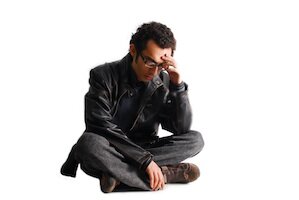Trigger Warning: physically and sexually violent imagery, transphobia
I recently moved to Boston from NYC. Moving can be stressful for a variety of reasons. As a trans man with mental illness, it can be especially stressful for me to try to make sure all of my healthcare continues without gaps.
Depression and anxiety are very common among gay men, and some of the most common reasons why some gay men feel depressed include the homophobia surrounding them of the feeling of guilt. I have many gay friends that use to feel guilty about being gay, because they believe they have not only disappointed and saddened their family, but also their friends. However, this isn’t a general rule. When it comes to depression, it is classified in chronic depression and severe depression. Fortunately, both of them can be treated.
Ugh. Stop. Seriously, stop. I don’t get why people keep asking why I’m depressed, or what I have to be depressed over. Really, it’s a dumb question. Ok, though, in fairness, maybe it’s not actually their fault – society is probably to blame here. People say that something is depressing, or they’re depressed, and what they really mean is that something happened, and it sucks, it’s a bummer, they’d prefer it didn’t happen.
I would like to welcome the newest member of our writing team, Nikki. In her first post with us, she talks about the expectations placed on abuse victims/survivors. Thanks for sharing with us, Nikki!
There was a thing going around Tumblr that I can’t find now because I still don’t totally understand Tumblr, and it was about being a “good abuse victim.” How a “good victim” never gets involved with abusers again. “Good victims” have scars to prove their abuse, they get everything documented, they go right into therapy. They get fixed, they don’t get abused again. “Good victims” publicly call out their abusers… or wait, is it that “good victims” just talk about it with people close to them and work it out themselves and never make a scene? I don’t know, I never did it “right.” I marched around calling myself a Survivor for years which, to me, was like a “better victim,” a stronger one. Cuz when you’re a victim you’re weak and when you’re a survivor you’re strong and you did “good victim” properly and graduated. I said FUCK YOU to victimhood like it was bad. But in retrospect that’s saying there’s a right and wrong way to handle abuse, and that’s bullshit. As a repeat VICTIM of abuse I wanted to look strong even though repeat abuse makes people look weak. But fuck these hierarchies of who handles abuse the best. I am a victim of abuse and I’m surviving.
No one ever said that this whole sobriety thing would be easy but I have found that it gets a whole lot harder the longer I go. I went to AA, I got a sponsor; I did everything that they told me to do. I even managed to go to a meeting a day. Yet at the same time the longer that I stay dry the more social situations that I find myself in where I am saying to myself, maybe one more would be okay. Take for example last night, I was asked over for a social occasion and it inevitably lead to me picking up, a beer in this case. But that beer lead to Tequila shots which led to, etc. etc. I got scary drunk, more drunk then I have gotten in a long time and while nothing bad happened, and I made it home safely and managed to crawl into bed. But see my alcoholic mentally ill mind tells me that because I did that, because nothing “bad” happened that it must be okay for me to drink again.
I would like to welcome the newest member of our writing team, Kaity Marie Baldwin. In her first post with us, she talks about taking responsibility for one’s own mental health. Thanks for sharing with us, Kaity!
It took me a long time to realize how lucky I was: a psychiatrist, a therapist, medication. All of these arranged in my life to provide the support I so desperately needed but wished I didn’t. Who wants to see a psychiatrist for the rest of their lives? Who wants to need therapy sessions? Support can sometimes be a reminder of why you need it, and it makes you feel so helpless.
I decided to track my moods intensely and also experiment on myself quite a bit with certain herbs and diets. I have written a couple of times before how a gluten-free vegan diet, and how reducing my refined sugar intake have drastically aided in helping me stabilize my mood rollercoaster. Another thing that greatly helped me was tracking my moods over time in a journal. I was able to take a few months and track my mania, depression, mixed states of every variety, as well as social, environmental, hormonal, and physical triggers for said mood shifts. I found that many of my mood changes are triggered by certain things (sexual assault triggers, social conflicts, hormonal shifts, dietary changes, etc) and behind those triggers is a larger more independent cycle of ups and downs lasting a couple of months at a time. In tracking the triggered ups and downs existing along the larger up and down shift of my mood over time, I can now identify when a mood state is changing and can identify where I am at.
Editor’s note: this is a continuation of Fuck. Schizoaffective?
It’s been two months since my diagnosis. Two months to process the psychosis, the diagnosis. Two months to adjust to new medication.
I never wanted to be a mother when I was young. Seduced by the freedom I could have as a single woman, at varying levels of “being about to take care of myself” financially and psychologically, I pushed onward. When I was 19 and in college I had an abortion. The father was irresponsible and unemployed, and I wanted to graduate. I wanted to live an exciting, satisfying life and knew if I kept the child I would be doomed to poverty and single-mother-dom before I had even gotten started.
It remains difficult for some to fathom the weight of stigmatization that is carried on the backs of the millions diagnosed with mental illness each year. Mental illness is, indeed, an illness. A disorder of the mind that equally affects the body. Mental illness is something that can make living day to day extremely difficult, painful (both emotionally and physically), and nearly impossible.










